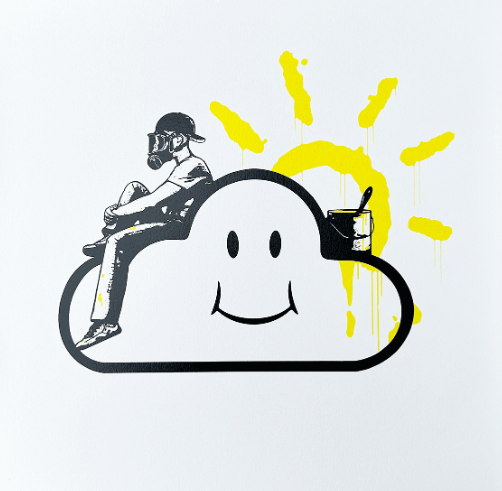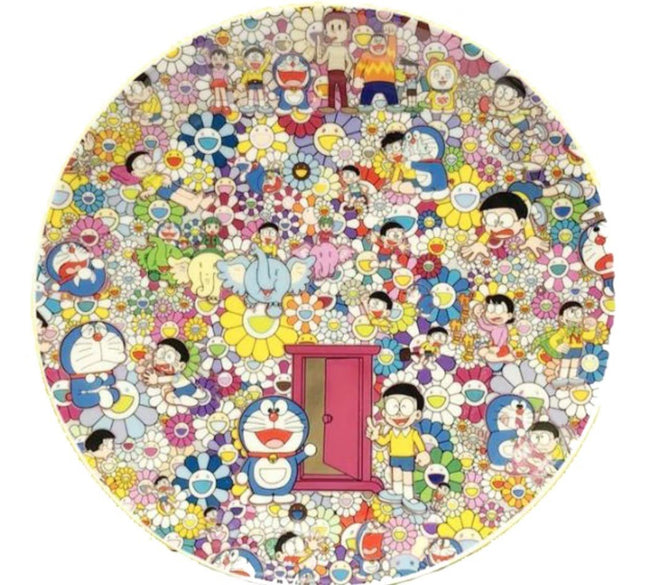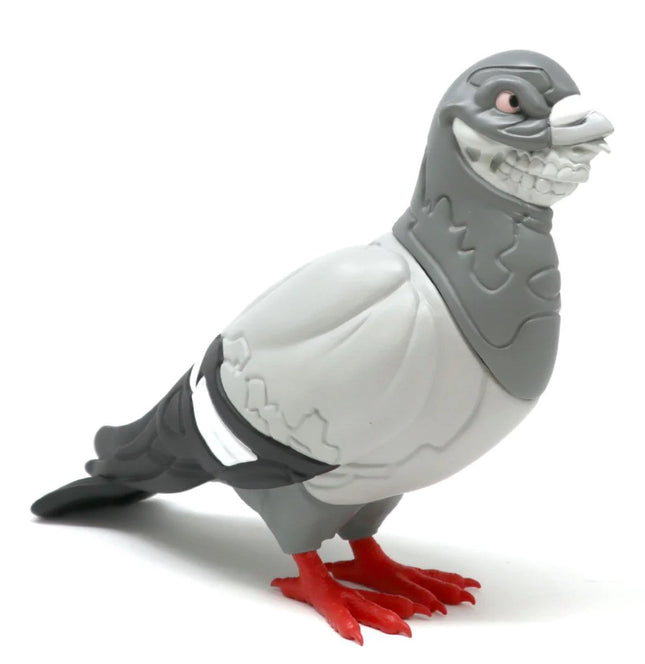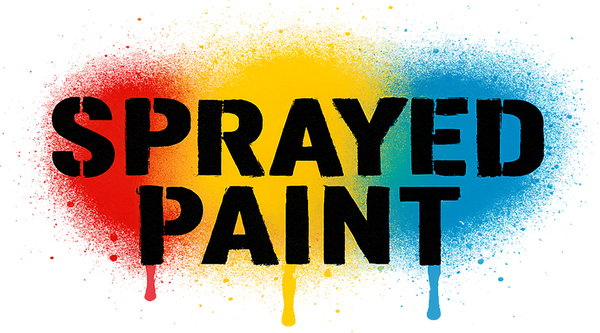
Smile
-

Takashi Murakami TM/KK Doraemon Exhibition Tokyo Archival Pigment Plate by Takashi Murakami TM/KK
Doraemon Exhibition Tokyo Plate Limited Edition Archival Pigment Print Art on Ceramic Plate Artwork by Famous Artist Takashi Murakami TM/KK. 2017 Limited Edition Size 9" Collectible Art Plate Takashi Murakami's Intersection of Traditional and Pop Culture Takashi Murakami, a renowned artist whose work has consistently blurred the lines between fine art and pop culture, created a piece for the Doraemon Exhibition in Tokyo that captures the essence of this fusion. The exhibition piece, a limited edition 9-inch ceramic plate, features Murakami's signature style, often incorporating brightly colored anime and manga characters into traditional artistic formats. Artistic Elements and Cultural Influence Murakami's work on the Doraemon Exhibition plate is an archival pigment print that brings street pop art's vibrancy to the ceramic medium. This artwork stands out for its amalgamation of characters from the popular Japanese series 'Doraemon' with Murakami's distinctive flower motifs and designs. The characters are set against a backdrop of many flowers, creating a complex, eye-catching pattern that represents Murakami's exploration of contemporary Japanese society and otaku culture within the context of historical artistic practices. Murakami's Unique Style and the Art World Murakami's approach often involves a dialogue between different cultural elements, combining traditional Japanese artistic techniques with the mass appeal of anime and manga. His method is rooted in the "Superflat" concept, which he coined to describe the cultural commentary embedded in his artworks. This style is evident in the Doraemon Exhibition plate, where the flattened pictorial plane and the juxtaposition of characters suggest a deeper narrative on the influence of pop culture in our lives. Pop Art, Street Art, and Their Confluence By incorporating elements of street pop art and graffiti artwork into his ceramic plate design, Murakami contributes to the ongoing conversation about the validity and importance of pop culture in the art world. He elevates the perception of animated characters by placing them within the context of 'high art,' challenging preconceived notions about the value and meaning of pop and street art. Collectibility and Murakami's Global Impact The Doraemon Exhibition plate is a piece of art and a collectible item that has garnered attention from art collectors and enthusiasts worldwide. Murakami's ability to traverse the line between art and commodity has made his works highly sought after, and pieces like the Doraemon plate continue to shape the landscape of contemporary art collecting. Through these collectibles, Murakami has left a significant mark on global art culture, influencing new generations of artists and collectors alike. This Doraemon Exhibition plate by Takashi Murakami is a testament to the transformative power of pop culture within the art world and its ability to create new dialogues and understandings across different mediums and cultural backgrounds.
$541.00
-

Buff Monster Orange Mister Melty Icon Painted HPM Acrylic Silkscreen Print by Buff Monster
Orange Mister Melty Icon Painted HPM Acrylic Silkscreen Print by Buff Monster Screen Print on Card Stock Fine Art Paper Limited Edition Pop Street Art Artwork. 2023 Signed & Numbered Acrylic HPM Embellished Limited Edition of 50 Artwork Size 9x12 With Heavy Drips of Hand Painted Areas. Orange Mister Melty Icon Painted HPM Acrylic Silkscreen Print by Buff Monster The Orange Mister Melty Icon Painted HPM Acrylic Silkscreen Print by Buff Monster is a dynamic expression of Street Pop Art & Graffiti Artwork. Created in 2023 as part of a signed and numbered limited edition of 50, this piece is a vibrant testament to Buff Monster’s signature visual language. At 9x12 inches, it may appear compact, but it radiates an oversized impact with its combination of hand-painted energy and silkscreen clarity. The Mister Melty character—a one-eyed melting creature—serves as both mascot and metaphor, embodying themes of transformation, absurdity, and surreal joy through explosive color and iconic simplicity. Visual Design and Layered Techniques This particular version features a fiery orange and yellow background with hints of magenta and red, layered beneath a carefully rendered silkscreen outline of Mister Melty. Dominated by a single, centered eye ringed in pink and grey, the character floats in a warped box frame that offers structure to the otherwise chaotic drips and paint splashes. Buff Monster used heavy acrylic embellishments to add texture and visual chaos, with paint layered thickly across the surface in a way that emphasizes spontaneity and kinetic motion. The background reveals halftone patterns and splatter marks, blending graffiti textures with pop art flatness. The Importance of HPM in Buff Monster’s Process HPM, or Hand-Painted Multiple, is key to the collectible nature of this print. Each version within the edition features unique hand-done elements added after the initial silkscreen pass. This not only makes every print one-of-a-kind but also injects a raw, painterly quality into what would otherwise be a tightly controlled print run. In this Orange Mister Melty variant, those embellishments take the form of vivid drips, erratic brushwork, and unexpected overlays, offering a visual punch that resonates with both street art authenticity and studio craftsmanship. Buff Monster’s Influence on Modern Street Pop Art Buff Monster, born in the United States, has long stood at the intersection of collectible toy culture, street graffiti, and psychedelic pop art. His work incorporates recurring motifs such as ice cream, goo, eyeballs, and drips, and reflects a fascination with Japanese pop aesthetics and underground comics. Mister Melty is one of his most recognized characters and functions as a canvas for creative experimentation. The Orange Mister Melty HPM print reflects Buff Monster’s continued push into handcrafted detail while maintaining the reproducible aesthetics of printmaking. It represents a collision of factory polish and street-level freedom, crafted for collectors who value unique, emotionally charged design. This print exists not just as a collectible, but as an energetic piece of the modern visual narrative that defines Street Pop Art & Graffiti Artwork today.
$650.00
-

Buff Monster Pink Green Mister Melty Icon Painted HPM Acrylic Silkscreen Print by Buff Monster
Pink Green Mister Melty Icon Painted HPM Acrylic Silkscreen Print by Buff Monster Screen Print on Card Stock Fine Art Paper Limited Edition Pop Street Art Artwork. 2023 Signed & Numbered Acrylic HPM Embellished Limited Edition of 50 Artwork Size 9x12 With Heavy Drips of Hand Painted Areas. Pink Green Mister Melty Icon Painted HPM Acrylic Silkscreen Print by Buff Monster The Pink Green Mister Melty Icon Painted HPM Acrylic Silkscreen Print by Buff Monster exemplifies the evolution of Street Pop Art & Graffiti Artwork through its vivid palette, sharp composition, and tactile embellishments. Released in 2023 as part of a signed and numbered limited edition of 50, this 9x12 inch print is part of Buff Monster’s ongoing exploration of his iconic Mister Melty character. Created on card stock fine art paper, each piece is hand-painted with bold acrylic applications layered over silkscreen foundations, making every print a one-of-a-kind composition of melting optimism and subversive cheer. Iconography and Visual Aesthetic This variant of Mister Melty is striking for its interplay between lush green tones and a vibrant central pink and gray eye. Mister Melty’s design is confined within a graphic, gray frame that intensifies the sense of structure against the chaos of the dripping, gooey textures that define the character’s form. The eyeball motif, central to Buff Monster’s visual identity, is rendered in a way that fuses cuteness with the grotesque. It floats in a surreal landscape of slime-like textures, splatter overlays, and amorphous shapes that evoke a psychedelic reinterpretation of cartoon imagery. The work is further enhanced by halftone patterns and airbrushed gradients that build movement into the stillness of the canvas. Technique and HPM Detailing What sets this print apart is its HPM status—Hand-Painted Multiple—which ensures that no two prints in the edition are alike. Buff Monster overlays each silkscreen base with hand-applied paint using brushes and drips to give each piece unique texture, color depth, and movement. This Pink Green edition is characterized by energetic splashes and swirls of green, yellow, and black, creating a layered tension between the structured screenprint and the unruly freedom of the painted surface. The drips and splatters give the piece raw energy while enhancing its sculptural effect, transforming the flat surface into something visceral and dynamic. Buff Monster and the Legacy of Mister Melty Buff Monster, based in the United States, has long championed a playful yet dark aesthetic inspired by Japanese culture, graffiti, heavy metal, and underground comics. His signature character Mister Melty is a visual metaphor for fleeting joy, absurdity, and transformation. It represents a blend of humor and decay, often shown melting or dripping as a symbol of impermanence. The Pink Green Mister Melty HPM print is a prime example of his style—a hybrid of pop iconography and street-level sensibility executed with the care of a studio painter. As a limited edition object, it functions both as a collectible and a canvas that reflects Buff Monster’s unique contribution to contemporary Street Pop Art & Graffiti Artwork.
$650.00
-

Buff Monster Green Mister Melty Icon Painted HPM Acrylic Silkscreen Print by Buff Monster
Green Mister Melty Icon Painted HPM Acrylic Silkscreen Print by Buff Monster Screen Print on Card Stock Fine Art Paper Limited Edition Pop Street Art Artwork. 2023 Signed & Numbered Acrylic HPM Embellished Limited Edition of 50 Artwork Size 9x12 With Heavy Drips of Hand Painted Areas. Green Mister Melty Icon Painted HPM Acrylic Silkscreen Print by Buff Monster The Green Mister Melty Icon Painted HPM Acrylic Silkscreen Print by Buff Monster captures the energetic essence of modern Street Pop Art & Graffiti Artwork. Released in 2023 as part of a numbered limited edition of only 50 prints, this piece stands out not only for its vivid design but also for its hybrid execution that merges silkscreen precision with raw hand-painted embellishments. Buff Monster’s approach continues to blur the boundaries between collectible design and fine art by infusing accessible formats with labor-intensive customizations. Each 9x12 inch print is individually touched by the artist, turning every edition into a unique object of visual delight. A Character Icon Evolved Into Canvas The print features Buff Monster’s iconic Mister Melty character reimagined with a bold, central composition. A single oversized eye commands attention from the middle of the page, framed inside thick black borders that give the impression of an expressive digital emoji turned physical. The character’s gooey surface is amplified with streaks, splatters, and thick drips of white and green acrylic paint, resulting in an effect that is part horror cartoon and part sticky psychedelic dream. The hand-painted marks on every print add motion, variance, and human imperfection to a template grounded in graphic repetition, making each print feel spontaneous and unfiltered despite its uniform base. Fusion of Screen Print and Acrylic Hand Detailing Created on card stock fine art paper, the silkscreen foundation provides a bold, flat application of colors with dense blacks that define Mister Melty’s signature contour. Over this structured design, Buff Monster applied heavy hand-painted drips and splashes in a fluorescent palette, giving the artwork a tactile and almost sculptural quality. This hand-painted modification, known as HPM or Hand-Painted Multiple, elevates the piece beyond traditional screen printing and into the realm of individualized contemporary art. No two versions of the edition are identical, which reinforces the street art ethos of impermanence and expression over replication. Buff Monster’s Artistic Universe and Urban Influence Buff Monster, based in the United States, is widely recognized for building a visual language that merges 1980s pop aesthetics with street art strategies. His world is filled with melting monsters, neon colors, ice cream motifs, and playful grotesquery. Mister Melty, a recurring figure in his works, encapsulates his approach to character-driven design with a twist of surrealism. This particular green edition reinforces Buff Monster’s tendency to explore new colorways and contexts for familiar icons, ensuring his work remains both cohesive and experimental. As part of his 2023 body of work, this Green Mister Melty HPM print carries forward his exploration of character iconography while enhancing its artistic value through hand-executed texture and spontaneous drips that echo graffiti’s raw sensibility. For collectors of Street Pop Art & Graffiti Artwork, this print is both a celebration of Buff Monster’s visual identity and a rare opportunity to own a one-of-a-kind painting disguised as a print.
$650.00
-

Ron English- POPaganda Staple Grin Pigeon Mono Art Toy by Ron English- POPaganda x Jeff Staple
Staple Grin Pigeon- Mono Limited Edition Vinyl Art Toy Sculpture Collectible Artwork by Pop Modern Artist Ron English- POPaganda x Jeff Staple. 2020 Limited Edition Artwork Size 8" Tall New In Box Stamped/Printed
$233.00
-

Buff Monster Pink Mister Melty Icon Painted HPM Acrylic Silkscreen Print by Buff Monster
Pink Mister Melty Icon Painted HPM Acrylic Silkscreen Print by Buff Monster Screen Print on Card Stock Fine Art Paper Limited Edition Pop Street Art Artwork. 2023 Signed & Numbered Acrylic HPM Embellished Limited Edition of 50 Artwork Size 9x12 With Heavy Drips of Hand Painted Areas. Pink Mister Melty Icon Painted HPM Acrylic Silkscreen Print by Buff Monster The Pink Mister Melty Icon Painted HPM Acrylic Silkscreen Print by Buff Monster is a visually electric entry into the 2023 limited edition series of Street Pop Art & Graffiti Artwork. Executed on durable card stock fine art paper and measuring 9 by 12 inches, this piece is part of a signed and numbered edition of only 50, each meticulously enhanced with acrylic hand-painted features. This work is not just a print, but a hybrid between screen-printed design and hand-applied textural innovation, exemplifying Buff Monster’s signature technique of turning graphic repetition into one-of-a-kind expressive characters. Vibrant Layers and Tactile Effects This print radiates with the power of hand-finished multiples, elevating a screen-printed foundation into a highly individualized object. The fluorescent pink base glows with intensity, encased in precision gray framing lines that guide the viewer's eye directly to the iconic single eyeball at the heart of the Mister Melty figure. Surrounded by drips, teeth, and surreal cartoon forms, the pink tones transition into deep, cracked textures that reveal a layer of black beneath, giving the work a charred, lava-like surface that evokes both heat and decay. This crackle effect is not merely decorative—it intensifies the impact of the eye as a central motif, suggesting stress, mutation, or transformation under pressure. Character Symbolism in Buff Monster’s World Mister Melty is a recurring character across Buff Monster’s universe, emblematic of the artist’s broader themes of sugary chaos, pop disintegration, and playful nihilism. In this pink version, the character becomes almost radioactive in tone, pushing the cuteness of pop into more volatile, molten territory. Buff Monster has long used his characters to challenge the polished aesthetic of mainstream pop art, infusing them with the unpredictability and texture found in graffiti. Mister Melty embodies both joy and entropy—melting, oozing, and grinning in a way that turns destruction into something celebratory. Buff Monster’s Role in Modern Graffiti and Pop Art Buff Monster, based in the United States, has built his career on blending the candy-coated colors of Japanese visual culture with the edge of Western street art and punk aesthetics. Known for his use of pink as a core palette across media, his work stands at the colorful frontier of Street Pop Art & Graffiti Artwork. This 2023 edition of Mister Melty confirms his commitment to craftsmanship and individual expression. With every print uniquely finished by hand and featuring unpredictable visual variance, the Pink Mister Melty Icon is a piece that blurs the lines between mass production and personal artistic statement. It is a celebration of texture, a confrontation with decay, and a vibrant artifact of modern urban iconography.
$650.00
-

Buff Monster Purple Pink Mister Melty Icon Painted HPM Acrylic Silkscreen Print by Buff Monster
Purple Pink Mister Melty Icon Painted HPM Acrylic Silkscreen Print by Buff Monster Screen Print on Card Stock Fine Art Paper Limited Edition Pop Street Art Artwork. 2023 Signed & Numbered Acrylic HPM Embellished Limited Edition of 50 Artwork Size 9x12 With Heavy Drips of Hand Painted Areas. Purple Pink Mister Melty Icon Painted HPM Acrylic Silkscreen Print by Buff Monster The Purple Pink Mister Melty Icon Painted HPM Acrylic Silkscreen Print by Buff Monster stands as a striking example of contemporary Street Pop Art & Graffiti Artwork. Released in 2023 as part of a signed and numbered limited edition of 50, this 9x12 inch piece is printed on heavyweight card stock and showcases a rich fusion of silkscreen technique with acrylic hand embellishments. Each print in the edition is transformed into a one-of-a-kind original through layers of vibrant paint applied directly by the artist. The use of purple, pink, and black with dynamic splatter and drip effects lends this edition a fierce visual energy and emotional impact. Visual Identity and Character Design Mister Melty, Buff Monster’s signature character, takes center stage in this hypnotic composition, defined by its single large eye, drippy contours, and melting features. The eyeball motif is iconic in Buff Monster’s work, serving as both a playful identifier and an emblem of omnipresent pop consciousness. In this version, the eye is encased in a thick ring of fluorescent pink, framed by gradients of metallic gray and surrounded by a surreal face that oozes with controlled chaos. The framed-in composition brings a graphic clarity to the visual mayhem, emphasizing Mister Melty’s cartoon-like personality while pushing its monstrous textures to the edge of abstraction. Technique, Texture, and HPM Application This edition is defined by the hand-painted multiple, or HPM, treatment. Each print begins with a silkscreened base that features Buff Monster’s trademark bold outlines and central iconography. What follows is a spontaneous layering of paint in shades of magenta, lavender, violet, and jet black, mixed with neon splashes and speckled overlays. The artist’s choice of vibrant drips and painted textures adds dimension to the piece, transforming each print into an expressive, tactile work of art. Halftone patterns and graffiti-inspired markings accent the borders and corners, grounding the work in street culture while elevating it into the world of fine art through meticulous execution. Buff Monster’s Position in Modern Urban Art Buff Monster, born in the United States, continues to be a major force in the evolution of modern Street Pop Art & Graffiti Artwork. His instantly recognizable characters, often rendered in electric color palettes and melty forms, pull from Japanese Kaiju, American cartoons, punk culture, and graffiti aesthetics. This Purple Pink Mister Melty Icon print reinforces his role as a cultural provocateur who merges commercial influence with independent artistry. Through characters like Mister Melty, Buff Monster explores ideas of identity, impermanence, and joy in a collapsing world. With its high-energy coloration and hand-finished surface, this edition not only celebrates the grotesque cuteness of his icon but also elevates the dialogue between street-based art and contemporary pop formalism.
$650.00








